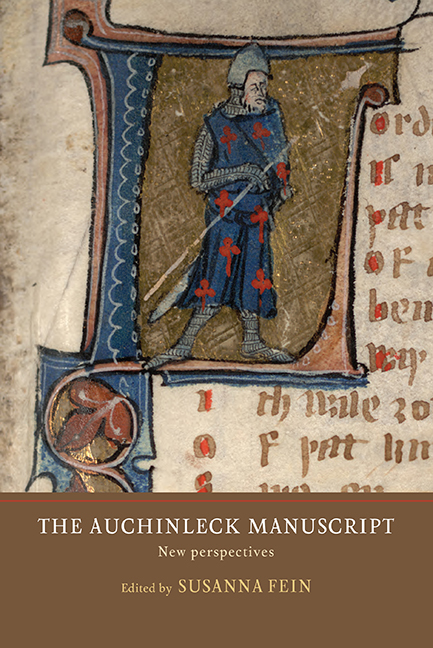Book contents
- Frontmatter
- Contents
- List of Illustrations
- List of Contributors
- Acknowledgements
- Abbreviations
- Note on the Presentation of Auchinleck Texts
- Introduction The Auchinleck Manuscript: New Perspectives
- 1 The Auchinleck Manuscript Forty Years On
- 2 Codicology and Translation in the Early Sections of the Auchinleck Manuscript
- 3 The Auchinleck Adam and Eve: An Exemplary Family Story
- 4 A Failure to Communicate: Multilingualism in the Prologue to Of Arthour and of Merlin
- 5 Scribe 3’s Literary Project: Pedagogies of Reading in Auchinleck’s Booklet 3
- 6 Absent Presence: Auchinleck and Kyng Alisaunder
- 7 Sir Tristrem, a Few Fragments, and the Northern Identity of the Auchinleck Manuscript
- 8 The Invention of King Richard
- 9 Auchinleck and Chaucer
- 10 Endings in the Auchinleck Manuscript
- 11 Paraphs, Piecework, and Presentation: The Production Methods of Auchinleck Revisited
- 12 Scribal Corrections in the Auchinleck Manuscript
- 13 Auchinleck ‘Scribe 6’ and Some Corollary Issues
- Bibliography
- Index of Manuscripts Cited
- General Index
- Manuscript Culture in the British Isles
6 - Absent Presence: Auchinleck and Kyng Alisaunder
Published online by Cambridge University Press: 21 May 2021
- Frontmatter
- Contents
- List of Illustrations
- List of Contributors
- Acknowledgements
- Abbreviations
- Note on the Presentation of Auchinleck Texts
- Introduction The Auchinleck Manuscript: New Perspectives
- 1 The Auchinleck Manuscript Forty Years On
- 2 Codicology and Translation in the Early Sections of the Auchinleck Manuscript
- 3 The Auchinleck Adam and Eve: An Exemplary Family Story
- 4 A Failure to Communicate: Multilingualism in the Prologue to Of Arthour and of Merlin
- 5 Scribe 3’s Literary Project: Pedagogies of Reading in Auchinleck’s Booklet 3
- 6 Absent Presence: Auchinleck and Kyng Alisaunder
- 7 Sir Tristrem, a Few Fragments, and the Northern Identity of the Auchinleck Manuscript
- 8 The Invention of King Richard
- 9 Auchinleck and Chaucer
- 10 Endings in the Auchinleck Manuscript
- 11 Paraphs, Piecework, and Presentation: The Production Methods of Auchinleck Revisited
- 12 Scribal Corrections in the Auchinleck Manuscript
- 13 Auchinleck ‘Scribe 6’ and Some Corollary Issues
- Bibliography
- Index of Manuscripts Cited
- General Index
- Manuscript Culture in the British Isles
Summary
ACCORDING to Chaucer's Monk, Alexander the Great's presence in the
Auchinleck manuscript is unremarkable:
The storie of Alisaunder is so commune
That every wight that hath discrecioun
Hath herd somewhat or al of his fortune.
For the Monk, Alexander's story is an exemplum of ‘false Fortune’ despite his chivalric glories (‘of knyghthod and of fredom flour’). The use of Alexander as an exemplum is indeed ‘commune’ in late-fourteenth-century literary culture, as shown by contemporary texts like John Gower's Confessio Amantis, in which Alexander (educated by Aristotle) is the perfect kingly ruler. Gower's deployment of Alexander in this way is not an innovation, since the Macedonian is found as an exemplum throughout his medieval literary career. Yet not all treatments of Alexander are equally didactic. The ‘storie of Alisaunder’ found in romance material is a multifaceted weaving together of ethical and philosophical reflection, battle prowess, and marvels both Oriental and magical. As his legend develops from late antiquity, the common feature in the accreted narratives is variety, making Alexander and his story a complex phenomenon, based in history yet depicted in fictive literature from an early date, and ethically ambivalent despite the conqueror's frequent extrapolation as an exemplum. The Monk's statement that Alexander is ‘commune’ is therefore accurate only up to a point. The Macedonian hero may well have been ubiquitous, but his ‘fortune’ was not a single one nor always easy to interpret from an exemplary standpoint. Before individual narratives and witnesses are considered, Alexander himself, a hero-villain who occupies indeterminate territory between history and fiction, makes contextualizing his narratives a difficult business.
The issue of contextualization is especially acute for the Alexander narrative in the Auchinleck manuscript (Edinburgh, NLS, MS Advocates 19. 2. 1), the latethirteenth- century Middle English romance Kyng Alisaunder based on the c. 1175 Anglo-Norman Roman de toute chevalerie by Thomas of Kent. Present in Auchinleck booklet 8, it is now largely lost because many relevant folios are missing, making it difficult to assess its immediate positioning in the manuscript. Kyng Alisaunder also raises questions beyond its local context because its place in Auchinleck's compilatio as a whole is difficult to understand.
- Type
- Chapter
- Information
- The Auchinleck Manuscript: New Perspectives , pp. 88 - 107Publisher: Boydell & BrewerPrint publication year: 2016
- 31
- Cited by



